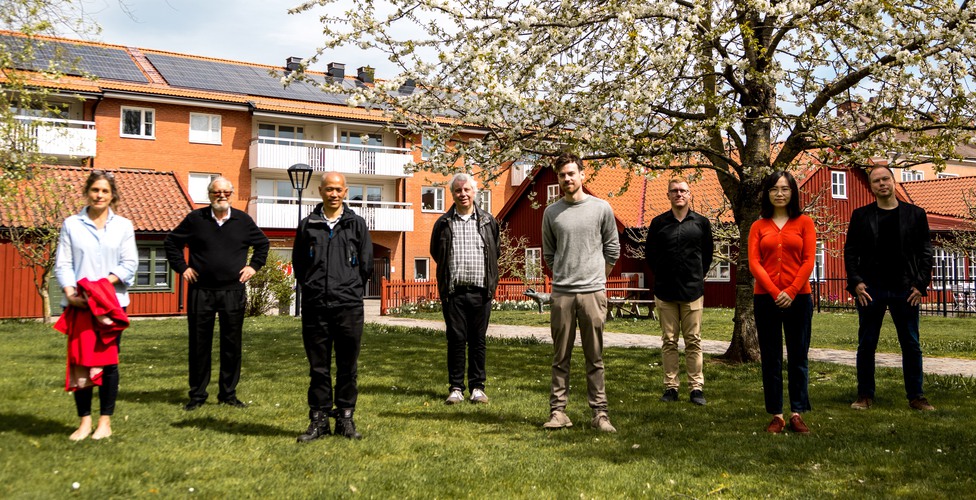Harmful cyber-attacks on electricity networks can have devastating effects on socially important functions. Researchers at the University of Skövde are therefore developing a prototype software that works proactively and finds the weak points in the electric power companies' IT systems. In collaboration with Skövde Energi and Skövde municipality, parts of the prototype have been tested - with good results, which show how research creates actual societal benefits.

From the left: Christine Mulder, University of Skövde, Sten Andler, Sten F Andler Consultancy, Jianguo Ding, University of Skövde, Manfred Jeusfeld, University of Skövde, Mathias Mellberg, Skövde Energi, Tobias Nilsson, Skövde municipality, Yuning Jiang, University of Skövde, Tony Blomkvist, Skövde municipality.
Most socially important functions, such as health care, water supply, food supply and communication, depend on reliable electricity supply. Attacks on these critical infrastructures can have a potentially devastating effect. Electrical systems today are very complex, digital and interdependent. To protect the infrastructure, researchers at the University of Skövde are developing a tool that will protect companies' IT systems and monitoring systems (so-called OT systems) from sabotage. The tool has now been tested in collaboration with Skövde Energi and Skövde municipality.
Collaboration develops the tool
– The collaboration with Skövde Energi has provided us with important insights. We learned how a complex network of software applications controls the electrical network and thus how the power delivery depends on the IT security of these software applications. The case study with Skövde Energi has given us valuable feedback on how we can transform our cyber security program into a useful and reliable tool for the electricity industry and beyond, says Manfred Jeusfeld, researcher at the University of Skövde.
With the new tool, Skövde Energi, and other electricity network companies, will be able to calculate the effect of cyber-attacks on the electricity supply to private customers, industrial customers and public institutions such as schools and hospitals. The researchers have also carried out tests with Skövde municipality, where they tested another part of the prototype that performs a vulnerability analysis of software.
Relevant for municipal electricity network companies
– The tool we develop will support decision-makers by automatically creating updated reports on vulnerabilities, such as a "heat map" that shows the threat points with the greatest risks in the company's IT network. The methods we have developed have proven to be very relevant for municipal electricity network companies and now a few more adjustments are needed to transform it into a reliable and user-friendly service for other IT security experts, says Manfred Jeusfeld.
The program that the researchers are developing will continue to protect the infrastructure against cyber-attacks in the future, even though the complexity of the systems is constantly growing. At Skövde Energi, the collaboration is viewed positively:
– For us, it is very important to collaborate with the University's researchers. The solutions with automated diagnostics of the IT security’s control system could be a good complement to our security work, says Mathias Mellberg, business developer IT at Skövde Energi.
When research becomes socially beneficial
The EU-funded research project ELVIRA was completed in 2020 under the coordination of Jianguo Ding from the University of Skövde. The full name of the project was "Threat modeling and resilience of critical infrastructures". The testing of the prototype that is now taking place is made possible with funding from Vinnova via Chalmers' innovation office and the Department of Collaboration and Communication at the University of Skövde (AFSI). The research group is now continuing to test further and develop the prototype with the consulting company Sten F Andler Consulting and AFSI.
– This is a brilliant example of when research results are taken further and given the opportunity to create real societal benefits and protect our critical infrastructures, says Christine Mulder, innovation advisor at AFSI at the University of Skövde.
